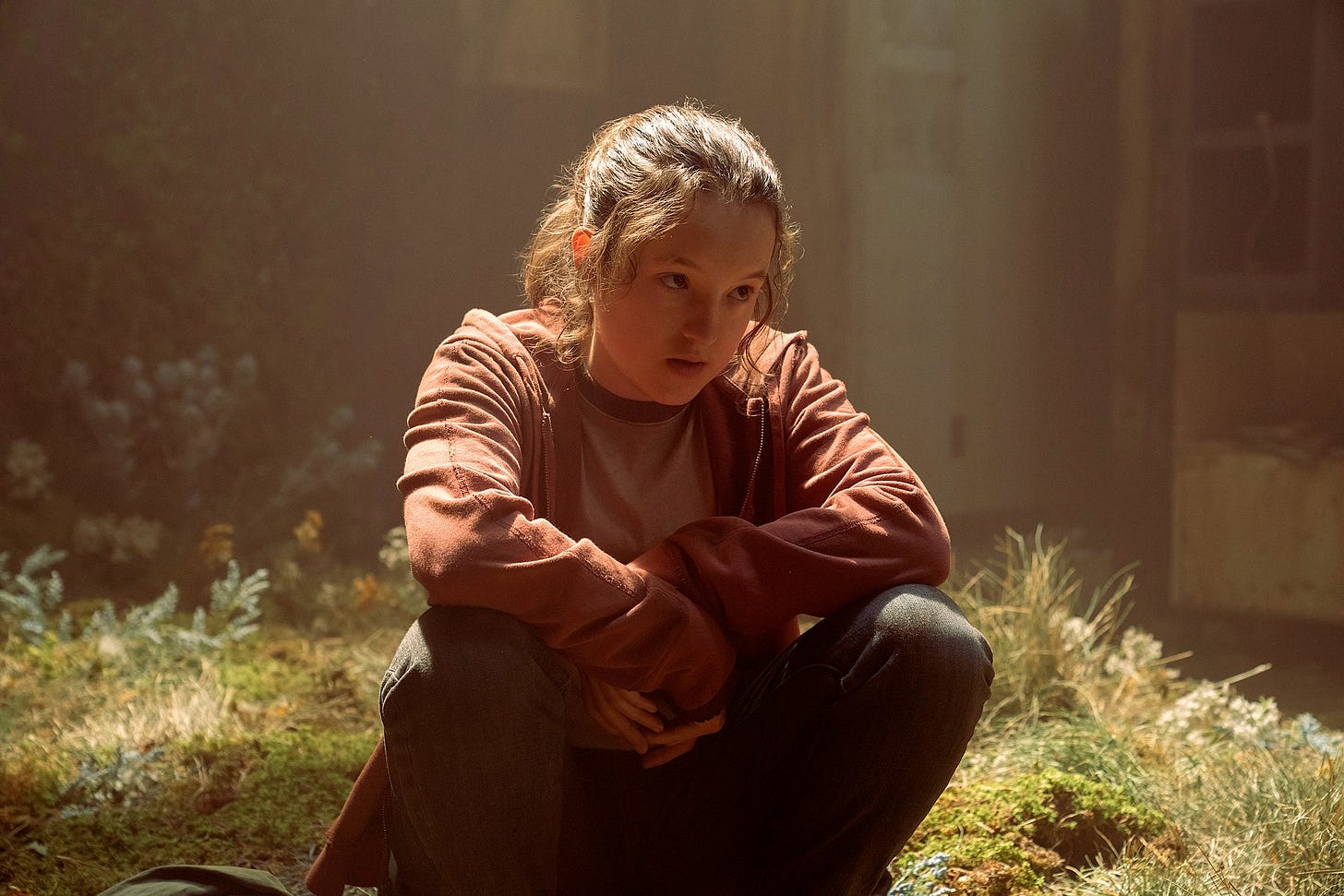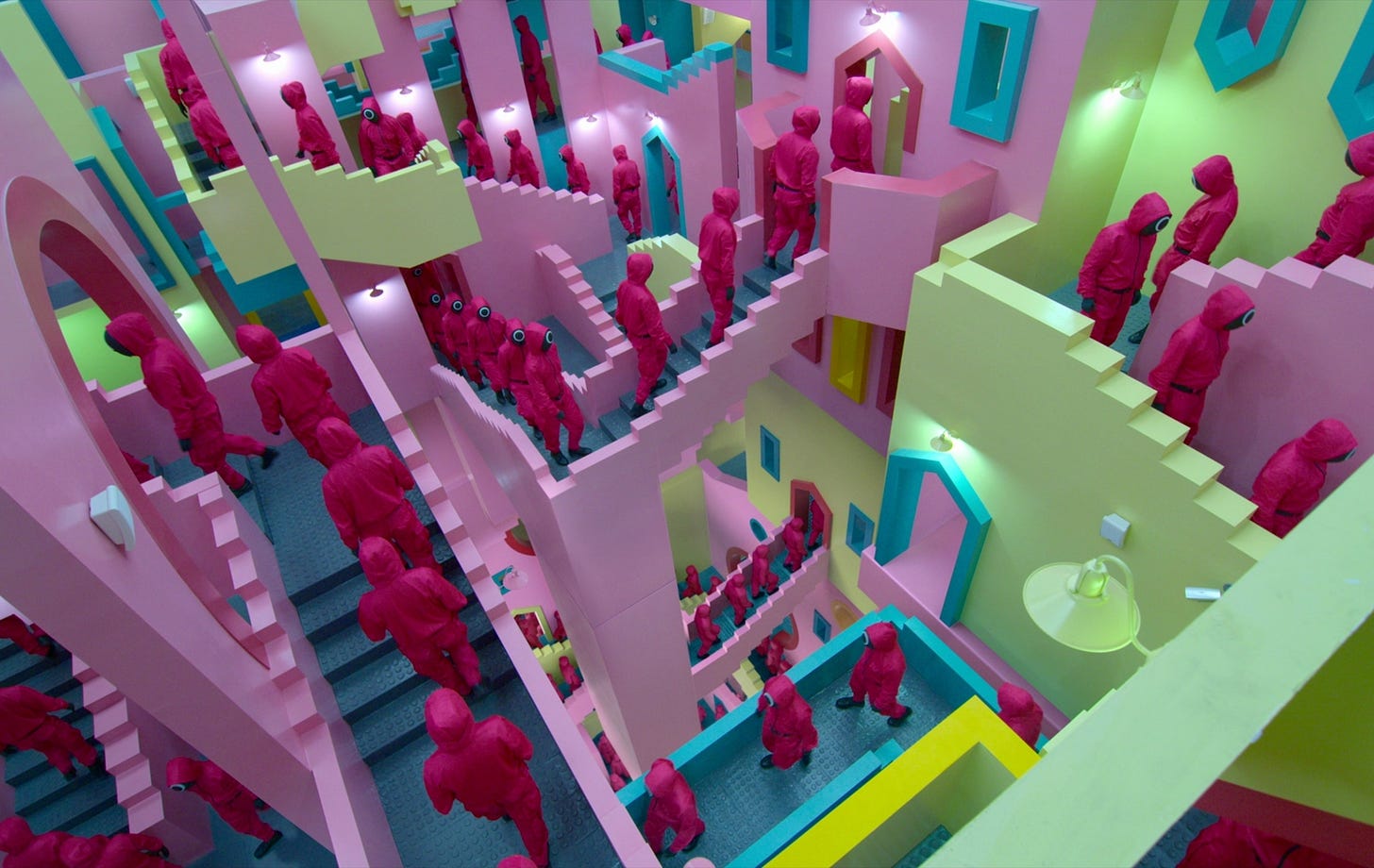Warning: Major spoilers for The Last of Us and Squid Game and minor spoilers for Black Mirror.
By the time that episode 3 debuted in the last week of January, it felt like the whole internet was talking about The Last of Us.
Having never heard of The Last of Us until the flurry of tweets flooded my timeline, I looked it up: a thriller-drama TV adaptation of a successful video game set in a post-apocalyptic version of our world where a fungal pandemic has taken over, turning humans into killer zombie-like shells of their former selves and decimating society.
Within the first five minutes of the pilot episode, The Last of Us made me feel absolutely terrified. Did it open with an intense jump scare of a zombie killing someone? Did the world burst into flames? Not even close.
The opening scene shows an epidemiologist, played by Scottish actor John Hannah, talking about how the pandemic that we should be scared of is a fungal one because there’s no vaccine for it. He speaks so calmly, easily and factually about how the world would end and we wouldn’t be able to do anything about it.
That first scene, even though we never see any of those characters again, sets the tone for the series: a numbingly horrible inescapable dread about the end of the world.
But even as I felt that dread spread through me, I was totally, completely sucked in. For the next six weeks, I refreshed my streaming service on the day of each new episode release and watched it immediately. I watched as grumpy dad Joel and moody teenager Ellie stumbled into each other’s path and began an unlikely cross-country journey together.
And yet when people asked me, ‘Oh, what do you think of that show? Should I watch it?’ I didn’t know what to say.
‘I’m not actually sure if I recommend it,’ I’d say eventually and try to explain myself.
Don’t get me wrong, I think The Last of Us is brilliantly made in practically every aspect. There’s so little to fault with the series. The acting is spectacular, from the lead performances by Pedro Pascal and Bella Ramsey to the massively talented cast of guest actors, the writing is poignant and the cinematography is gorgeous.
But every single episode made me cry at least once. Every single episode made me feel scared. Horrible. Pessimistic. Were these things I actually wanted to feel?
But then I’d go back the following week. So something was clearly there. What was it?
What’s the worst that could happen?
For me, the biggest moment of sheer panic came during episode 1 when Joel, Tommy and Sarah lose control of their truck and are stranded in a street full of infected (which also happens to be on fire). But the episode that made me feel the most sick and revolted was episode 8.
This was the penultimate episode of the season, so maybe by then I had more of a sense of what horrible things were coming.
I don’t even want to write them out here: this is the episode with the cannibalistic cult leader David who tries to kill, eat and rape Ellie.
After watching episode 8, The Last of Us reminded me most of Squid Game.
About halfway through watching Squid Game, I realised that the show was basically proceeding along the lines of ‘What’s the worst thing that could happen? That’ll happen next.’
I made this discovery as the characters were forming pairs ahead of the marble game in episode 6, which meant that as I watched the characters pair up with their friends, I felt with a sinking certainty that they were going to have to kill their partners.
Watching Squid Game did make me wonder about the value of a story which considers the worst case scenario. How does it actually advance the narrative as a whole? If that’s all there is to it, is the show actually just about shock value rather than storytelling?
That’s how I felt at the end of episode 8 of The Last of Us.
It’s about the giraffe
Ellie is so clearly changed at the start of episode 9 that she feels like a different person. Once bouncing with energy, bold, loud, even often verging on annoying and rude, she has become quiet, reserved and shy.
Even grumpy Joel’s attempts to cheer her up don’t seem to work. You start to wonder if Ellie is gone forever.
Until she sees the giraffe.
I cried watching Ellie with the giraffe. That something so simple could bring her so much joy. That she could even still experience joy after the horrors that she’s been through.
I stopped thinking about Squid Game. Instead, the show began to remind me more of Black Mirror.
Black Mirror is a horror anthology series where each episode features a new cast of characters. Instead, the episodes are linked thematically as each story revolves around some new sci-fi technology. It gets as dark as The Last of Us episode 8 over and over again.
There have been many episodes of Black Mirror which are so dark that they have made me question why I’m watching it. Shut Up and Dance and White Bear come to mind.
But the genius of Black Mirror is that almost every episode ends horrifically. Almost. Occasionally, an episode will end happily. And it will be such a genuine surprise that, after an hour of wondering what unspeakable horror is about to befall the characters, I will feel such an incredible rush of joy that happiness is possible even in the darkest of times.
So maybe this is the point of The Last of Us. It’s about the giraffe. It’s about Bill finding Frank. It’s about Ellie’s joke book.
The verdict
Is The Last of Us worth all the heartache? Honestly, I still don’t know.
The show has been renewed for another season to be based on the game’s follow-up, The Last of Us Part II. While I don’t know the plot of the sequel game, I’ve heard it’s somehow even darker than its predecessor which makes me reluctant to tune into season 2 of the show.
Will I watch it anyway? I’m pretty certain I will.






